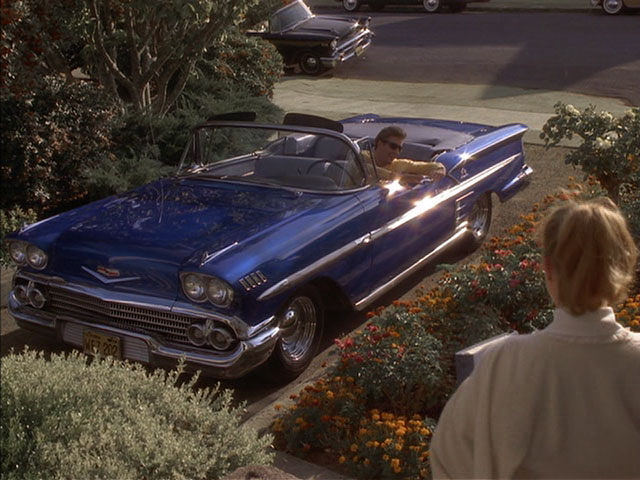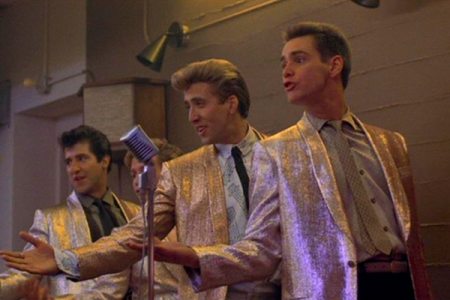Netflix-a-thon (#26) Francis Coppola's PEGGY SUE GOT MARRIED
(Note: Tonight was another mishap, and one that further shakes some if not all of my confidence in Netflix-Instant streaming: Skipping. That's right, thanks to some bad Ip address or something out there, my movie was skipping! I had to do a reboot of my blu-ray player to get it back up and functioning, and then midway through the film it did another of it's 'rebuffering' things. Sigh. Aside from that, very good presentation of an excellent studio feature)
It's one of those premises that every writer who deals a little in fantasy, or just any one in general, comes across: what would we change if we could go back and do such and such a thing to change the present course of events. And surely for Hollywood this is the kind of premise that can be a goldmine for stories, usually of the sort that give the audience a nostalgic trip back in time. Peggy Sue Got Married follows quickly on the heels of Back to the Future, only with less specific science fiction. The path that Peggy Sue takes to getting to her 1960 time-warp is akin more to a Wizard of Oz treatment, where she's totally conscious of everything around her, even if everything is a dream. At first she finds it aptly ridiculous, takes some drink and is cognizant of it being a dream. And then she wakes up. Still 1960. Oh, Darn.
 |
| As wholesome as apple pie... well, this was before Body Heat, kinda, technically.. |
The whole movie has a bit of a strange air to it, despite being a Frank Capra-esque journey into adolescence and love. Perhaps this is accentuated in a uproarious climax when Peggy Sue tries to find a path back to the present day with her grandfather's, uh, cult or whatever of people in funny hats and in ceremonial garb trying to get her back to the future. This is the extent of it, anyway, and also Nicolas Cage's performance. He can be so alarming with his off-beat comedy sometimes (not taking into account his crazier roles as 'off-beat'), and surprisingly charming. Somehow, indeed, some women out there really find him attractive. He takes that to a fine mixture in his performance as Peggy Sue's lover-boy-soon-husband Charlie, who is a happenin' cat with a bit of a nerdy voice (oddly inspired by Pokey from Gumby), and yet a wower when it comes to Doo-Wop and singing.
He's an odd-duck of an actor to be playing such a role, but that is one of the things that makes Peggy Sue Got Married so interesting and charming. He's not too conventional a leading man, but one can see why Peggy Sue would fall for him, desperately in love, but at the same time as she's "back in time" Peggy Sue and why she would want to instead try for the beatnik Michael Fitzsimmons (Kevin J. O'Connor), who looks cooler and faster and has a bike and poetry and pot and stuff. These aren't too hot or conventional guys, but the kind that a teenage girl in a small town might have considered marrying - or did, as case happens, with some not-so-great results. On the surface, yeah, it is a conventional kind of story, but the trick is to see how it plays out with the relationship, how Charlie responds to all of this tap-dancing Peggy Sue does as she knows all too well how things will go. (Btw, the revelation as what Michael wants to do with Peggy Sue when high school ends is the one really outrageous moment of comedy, well earned).
It might be somewhat startling that a film so... lightweight would come from a director so into the nitty gritty and harsh times of people in gangster-dom and Vietnam and so on. But it's really just another side of the coin from a director who a few years before made The Outsiders and Rumble Fish. Same ballpark, just a different game. And when it comes to doing a piece that should, on paper, seem so simple a rom-com, it turns out by its director to have much more heart and soul than I have given it credit for going in. The dialog, akin to Back to the Future, is knowing about how we were and how we change, or how personalities connect when they're in small groups as are the teens at the high school, the cliques and the gossiping. It is, unusual for a studio rom-com, genuinely clever writing, often for banter from Kathleen Turner's Peggy Sue or Charlie; just watch them in the scene where they 'neck' in the car at night, and how Peggy Sue actually goes too far for Charlie sexually(!) It's a minor hoot.
And Turner meets Coppola more than halfway. While I might've been more charmed and laughed harder with Cage on screen doing his thing (and also touched unexpectedly with a scene where he breaks down crying in a basement argument), it's Turner's movie and she takes her character to some wonderful places. I liked how Turner made Peggy Sue unwittingly smarter than those around her, with some of her talk and her knowingness of what's come already. She's a self-conscious character, but Turner doesn't wise-ass it so much as to make her super-cynical. Like a Capra lead she's in happy awe about what she sees... until she isn't, and knows how twisted life can become, or how sad it is as when Peggy Sue hears her grandmother's voice on the phone and later sees her. The key to her performance is being a 30-something year old playing 17, and being believable as 17 AND 30, sometimes in the same scene. The humor comes from a knowing, gentle irony that surprisingly works, and usually based on how to walk, position the hair, wear a sweater, simple but actually complex actor mechanics.
Peggy Sue Got Married is freed from some of the potential paradoxes that come with a time travel movie (no photographs with fading relatives here), and all the better as a whimsical fantasy with touches of existential tragedy. The stakes are only so high inasmuch that a character is reliving life, seeing all of the old ways and people and mannerisms and music, and getting that oh-so-gracious second chance, with the potential for reprieve. Coppola's movie is not pioneering anything too far, but it's "fun". There's nothing wrong with a director of such stature as "The Godfather-Man-King" making a 'fun' movie, so long as it's done with some heart and understanding of the genre, and with little improvements to what we can expect with the characters and their motivations. As far as throwback late 50's/early 60's go, it's certainly truer and less idiotic than Grease.
 |
| Nic Cage prepares for his next role in Wild at Heart by first living the 50's as a yuppie... yeah, weird. |
PS: Also feauring some fantastic side actors given some good if small roles: Jim Carrey, Joan Allen, Catherine Hicks, Barry Miller, and ... John Carradine!





Comments
Post a Comment